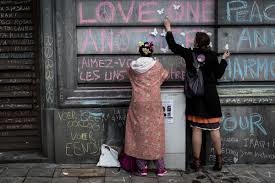Archive for March, 2016
Naming the dead
Posted by cathannabel in Politics, Refugees on March 25, 2016

Once again I’m naming the dead. Listing the names of the latest victims of murderous fanaticism. But whilst the names of the dead in Brussels are emerging, gradually, and will be published in our news media as they do, I have trawled the internet in vain for the names of those who died at Grand Bassam, as I did for those who died in Ouagadougou and Bamako, in Ankara and elsewhere. I’ve found a few – usually those of foreign nationals – but only a few. I want to honour them too, they merit that as much as those who died in Brussels or Paris. But I don’t know who they are.
So if I list the names of those who died this week in Brussels, as I listed those who died in Paris, it is not because I think European lives are more important or that terrorist attacks on European soil matter more than atrocities in Africa, Asia, the Middle East.
What listing the names of those murdered in European cities does is to show the cosmopolitanism of those targets. The names tell their own stories of migration and mobility – those who travel freely for pleasure or work or family, as well as those who have travelled to escape desperate poverty, persecution or war. That’s exactly what Daesh hate, of course. That on those city streets those of every faith and none mix freely, travel together, work together, eat together, enjoy music together.
But whilst the attacks on Paris and Brussels are explicitly aimed at the western cosmopolitanism that epitomises the grey zone, ‘that place between black and white, where nothing is ever either/or and everything is a bit of both’, the majority of their victims are Muslim. After all, most of their murderous attacks take place in predominantly Muslim countries – Daesh hate those who espouse what they regard as the wrong type of Islam as much if not more than they hate those who espouse a different faith or none at all.
How we respond on social media to these atrocities does matter. It may be easy to retweet, like, share, sign and so forth but that doesn’t mean it’s worthless. It’s not enough, of course, but for many of us it’s all we can immediately do.
So what do we say? Do we change our profile pictures to the flag of the country where the latest murders have taken place? Do we assert that ‘je suis/nous sommes/we are all…’? Again, it’s important if we do those things that we do them for Mali, Ivory Coast, Turkey or Pakistan as readily as we do for France or Belgium.


Whatever we say, we need to say and keep saying that refugees are welcome. Because even before the names of the dead or the backgrounds of the killers are known, the usual suspects here and in the US are telling us that we’re to blame for letting ‘them’ in. Even before we know who died, and who killed them, we’re told that it’s the refugees fleeing war and terrorist brutality who are the cause of ‘our’ losses. We have to reject that othering which is, after all, exactly what Daesh want. In their world everything is polarised, and most of humanity is that Other that can be slaughtered without compunction. As terrorists they want us to fear and to hate, and governments to react with repressive and prejudicial legislation, to drive people out of the grey zone and into crusadership or caliphate.

Of course we may well be afraid, however much we assert otherwise to show our solidarity with each other against the murderers. We will be angry, we should be angry, that so many lives are being taken, that such brutality is being unleashed on so many. But alongside those emotions, we need to inform ourselves, to try to comprehend. As Jason Burke says, in his important and fascinating book, The New Threat from Islamic Militancy,
Trying to understand does not imply any sympathy. It simply means we need to set aside our very natural anger, disgust and fear in order, as dispassionately as possible, to learn. We need, above all, to avoid the trap that the extremists have fallen into: that of shutting ourselves off, of closing our minds, of succumbing to the temptation of wilful ignorance. In the aftermath of terrorist attacks, victims, the maimed and the bereaved, always ask a very fundamental, very human question, ‘Why did this happen?’ We owe it to them to make the effort it takes to find the answer.
We honour the dead by naming them, when we can. By refusing to shut our minds and our hearts – or indeed our borders. By asserting our shared humanity, that what unites us is so much greater than what divides us. By trying to understand.

http://www.theguardian.com/commentisfree/2015/nov/20/isis-binary-struggle-grey-zone-jihadism
http://www.theguardian.com/commentisfree/2015/nov/15/terrorists-isis
https://kenanmalik.wordpress.com/2016/03/23/after-brussels-once-again-thinking-through-terror/
https://www.opendemocracy.net/nafeez-ahmed/isis-wants-destroy-greyzone-how-we-defend
http://howafrica.com/can-never-beat-terrorism-care-victims-equally/comment-page-1/#comment-31986
http://www.theguardian.com/commentisfree/2016/mar/24/dead-brussels-ankara-baghdad-raqqa





